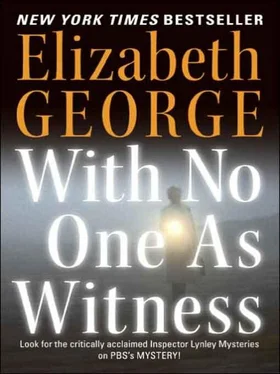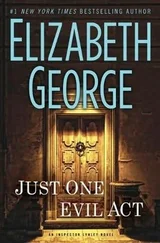“Okay. I can see that. But it was only a lie of omission. She just didn’t tell me when she could have told me. Or should have told me. Or whatever.”
“That is not it at all.”
“What is it, then?”
“She lied to me, Barbara.”
“To you? About-”
“And this is something I will not accept.”
“But when? When did she lie to you?”
“When I asked her about the CD. She said you had given it to her-”
“Azhar, that was true .”
“-but she failed to include the information about where it had come from. That in itself slipped out when she was chatting about CDs in general. About how many there were to choose from at the Virgin Megastore.”
“Bloody hell, Azhar, that’s not a lie, is it?”
“No. But the outright denial of having been in the Virgin Megastore is. And this is something that I will not accept. Hadiyyah is not to start that with me. She will not begin lying. She will not. Not to me.” His voice was so controlled and his features so rigid that Barbara realised far more was being discussed than his daughter’s initial venture into prevarication.
She said, “Okay. I get it. But she feels wretched. Whatever your point is, I think you made it.”
“I hope so. She must learn that there are consequences to the decisions she makes, and she must learn this as a child.”
“I don’t disagree. But…” Barbara drew in on her cigarette before she dropped it to the front step and ground it out. “It seems like making her admit her wrongdoing to me-sort of like in public?-is punishment enough. I think you should let her keep the CD.”
“I’ve decided the consequences.”
“You can bend, though, can’t you?”
“Too far,” he said, “and you break on the wheel of your own inconsistencies.”
“What happens then?” Barbara asked him. When he didn’t reply, she went on quietly with, “Hadiyyah and lying…This isn’t really what it’s all about. Is it, Azhar.”
He replied, “I will not have her start,” and he stepped back, preparatory to leaving. He added politely, “I have kept you from your toast long enough,” before he returned to the front of the property.
NO MATTER HIS conversation with Barbara Havers and her reassurance on the subject, Winston Nkata didn’t rest easily beneath the mantle of detective sergeant. He’d thought he would-that was the hell of it-but it wasn’t happening, and the comfort he wanted in his employment hadn’t materialised for most of his career.
He hadn’t started out in police work feeling uneasy about his job. But it hadn’t been long before the reality of being a black cop in a world dominated by white men had begun to sink in. He’d noticed it first in the canteen, in the way that glances sidled over to him and then slid onto someone else; then he felt it in the conversations, how they became ever so slightly more guarded when he joined his colleagues. After that it was in the manner that he was greeted: with just a shade more welcome than was given the white cops when he sat with a group at table. He hated that deliberate effort people made to appear tolerant when he was near. The very act of diligently treating him like one of the lads made him feel like the last thing he’d ever become was one of the lads.
At first he’d told himself he didn’t want that anyway. It was rough enough round Loughborough Estate hearing himself called a fucking coconut. It would be that much worse if he actually ended up becoming part of the white establishment. Still, he hated being marked as phony by his own people. While he kept in mind his mother’s admonition that “it doesn’t make you a chair ’f some ignoramus calls you a chair,” he found it increasingly difficult just to keep himself moving in the direction he wanted to go. On the estate, that meant to and from his parents’ flat and nowhere else. Otherwise, it meant upward in his career.
“Jewel, luv,” his mother had said when he phoned her with the news of his promotion. “Doesn’t matter one bit why they promoted you. What matters is they did , and now the opening’s there. You walk through it. And you don’t look back.”
But he couldn’t do that. Instead, he continued to feel weighed down by AC Hillier’s sudden notice of him when before he’d been nothing more to the man than a passing face to which the assistant commissioner could not have put a name if his continued existence had depended upon it.
Yet, there was still so much truth to what his mother had said. Just walk through the opening. He had to learn how to do it. And the entire subject of openings applied to more than one area of his life, which was what he was left thinking about once Barb Havers departed for the day.
He took a final look at the pictures of the dead boys before he too left the Yard. He did it to remind himself that they were young-terribly young-and as a consequence of their racial background, he had obligations that went beyond merely bringing their killer to justice.
Below, in the underground carpark, he sat for a moment in his Escort and thought about those obligations and what they called for: action in the face of fear. He wanted to slap himself stupid for even having that fear. He was twenty-nine years old, for God’s sake. He was an officer of the police.
That alone should have counted for something, and it would have done in other instances. But it counted for nothing in this situation, when being a cop was the single profession in life least designed to impress. Yet…It couldn’t be helped that he was a cop. He was also a man, and a man’s presence was called for.
Nkata finally set off with a deep breath. He followed a route across the river to South London. But instead of heading home, he took a detour round the curved brick shell of the Oval and drove down Kennington Road in the direction of Kennington Station.
The tube itself marked his destination, and he found a place to park nearby. He bought an Evening Standard from a vendor on the pavement, using the activity to build up his courage for walking the length of Braganza Street.
At its bottom, Arnold House-part of Doddington Grove Estate-rose out of a lumpy carpark. Across from this building, a horticultural centre grew behind a chain-link fence, and it was against this fence that Nkata chose to lean, with his newspaper folded beneath his arm and his gaze on the third-floor covered walk that led to the fifth flat from the left.
It wouldn’t take much effort to cross over the street and weave his way through the carpark. Once there, he was fairly certain the lift would be available since, more often than not, the security panel giving access to it was broken. How much trouble would it be, then, to cross, to weave, to punch the button, and then to make his way to that flat? He had a reason to do so. There were boys being murdered across London-mixed-race boys-and inside that flat lived Daniel Edwards, whose white father was dead but whose black mother was very much alive. But then that was the problem, wasn’t it. She was the problem. Yasmin Edwards.
“Ex- con vict, Jewel?” his mother would have said had he ever had the nerve to tell her about Yasmin. “What’n God’s name you thinking ?”
But that was easy enough to answer. Thinking of her skin, Mum, and how it looks when a lamp shines against it. Thinking of her legs, which ought to be wrapped round a man who wants her. Thinking of her mouth and the curve of her bum and the way her breasts rise and fall when she’s angry. Tall she is, Mum. Tall to my tall. Good woman who made one very big mistake, which she’d paid for like she ought.
And anyway, Yasmin Edwards wasn’t really the point. Nor was she the target of duty. That was Daniel, who at nearly twelve could well be in the sights of a killer. Because who knew how their killer was choosing his victims? No one. And until they did know, how could he-Winston Nkata-walk away from giving a warning where it might be needed?
Читать дальше












